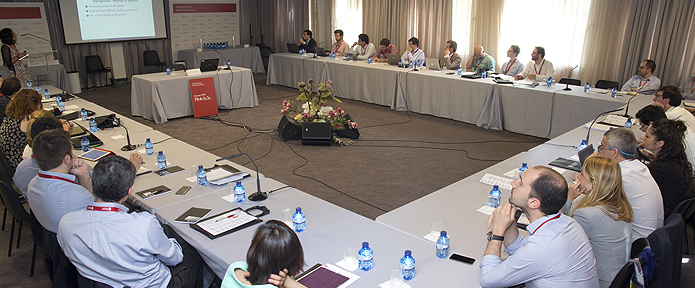The Objectives of development, the quality of exports and the management of natural resources, some of the topics of the second workshop of the V NCID Research Workshop
It was organized by the Navarra Center for International Development and the Ramón Areces Foundation.

The second workshop of the V NCID Research Workshop, organized by theNavarra Center for International Development of the University of Navarra and the Ramón Areces Foundation, focused on macroeconomic stability in countries at development. Research was presented on topics such as the Objectives of development, the quality of exports and the management of natural resources.
Giugliemo Caporale, from Brunel University, opened the workshop with a discussion paper on the main statistical properties of the Emerging Market Bond Indicator (EMBI) in four Latin American countries: Argentina, Brazil, Mexico and Venezuela.
Margarita Rubio, from the University of Nottingham, presented a paper that develops a model DSGE to study the implementation of macroprudential policies in low-income countries. The model presents a Economics with two agents: households and entrepreneurs. Entrepreneurs are the borrowers in this Economics and need capital as collateral to obtain loans. The macroprudential regulator uses the collateral requirement as a policy instrument.
Stefania Fabrizio of the International Monetary Fund (IMF) spoke next, focusing on policies in support of the Sustainable Development Goals (SDGs). development . The SDGs include the notion that the development should be economically, socially and environmentally sustainable. Recognizing the need for a comprehensive vision of growth, the IMF is increasingly emphasizing policies that promote sustainable growth, including through (1) economic diversification and structural transformation within a stable macroeconomic framework ; (2) gender and financial economic inclusion; and (3) climate and environmental sustainability.
The next speaker was Fidel Pérez Sebastián, from the University of Alicante, who presented work Natural resources, decentralization and risk sharing: can resource booms unify nations? programs of study previous indicate that a positive regional fiscal shock, such as a resource boom, reinforces the desire for separation. Your authors constructed a model that sample that an unexpected resource causes the nation to centralize.
Christiana Anaxagorou, from the University of Sheffield, presented an analysis relating the fungibility of foreign financial aid to institutional quality. The notion of fungibility is defined as financial aid not being used for donor-determined purposes. This research focuses in particular on how the effects of financial aid on public expense and revenues change from agreement with institutional quality. The hypothesis is that the fungibility Degree depends on institutional quality in recipient countries, arguing that the fungibility of financial aid would be higher in countries with institutions of leave quality.
The workshop ended with a lecture to position by Chris Papageorgiou of the International Monetary Fund, entitled 'Export Diversification and Quality Improvement'. Papageorgiou develops new estimates of export quality, covering 178 countries and hundreds of export products over the period 1962-2010. The study finds that quality improvement is particularly rapid during the early stages of a country's development . There is significant heterogeneity among countries with a quality growth rate. In any exported product line, quality converges over time globally. Institutional quality, liberal trade policies, FDI inflows, and human capital promote quality improvement, although the impact varies across sectors. The results of their work suggest that reducing barriers from entrance to new sectors can allow economies to benefit from rapid quality convergence.
